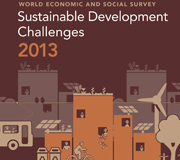
New strategies are needed to address the impacts of rapid urbanization around the world, including increasing demands for energy, water, sanitation, public services, education and health, according to the World Economic and Social Survey 2013.
The 2013 Survey examines the many challenges that must be addressed to achieve sustainable development. The United Nations Conference on Sustainable Development—Rio+20–set out a framework for action and follow-up across a wide range of issues and the Survey zooms in on three critical challenges – food security, energy transformation and sustainable cities.
According to the Survey produced by the UN Department for Economic and Social Affairs, more than 6.25 billion people will be living in cities by 2050. During the period from 2000-2050, developing regions could add 3.2 billion new urban residents, a figure larger than the entire world’s population in 1950.
The rapid rate of urbanization underlines the urgency to address multiple sustainable development challenges facing the planet, including many outcomes of the Rio+20 Conference in 2012.
“Rio+20 reaffirmed commitment to sustainable development and adopted a framework for action and comprehensive follow-up,” UN Secretary-General Ban Ki-moon wrote in the foreword to the Survey. “The World Economic and Social Survey 2013 serves as a valuable resource as we look towards translating the outcome of Rio+20 into concrete actions.”
The Survey found that the vision of sustainable development—promoting economic and social well-being while protecting the environment — has not been achieved, despite encouraging progress. Rising inequality, gaps and shortfalls in development partnership, rapid population growth, climate change and environmental degradation have hampered efforts.
Damage to the global environment is reaching critical levels and threatens to lead to irreversible changes in global ecosystems, according to the Survey. The overarching environmental challenge is anthropogenic climate change with the increased concentration of greenhouse gases in the atmosphere—most importantly, CO2— which is leading to a warming of the planet.
Wu Hongbo, UN Under-Secretary-General for Economic and Social Affairs, said the Survey highlighted the need for innovative strategies and investments to promote sustainable development, including in the world’s cities. “Cities play an essential role in expanding the possibilities for economic growth, innovation and social development,” he noted. “But we have to take actions now that will enhance the benefits of cities, while reducing the threats to sustainable development.”
If no policy framework is established to address this issue, the Survey says, the number of people living in slums lacking access to basic infrastructure and services such as water, sanitation, electricity, health care and education might triple from one billion at present to three billion by 2050.
Sustainable development of urban areas, the Survey states, requires integration and coordination, and investments to tackle land-use issues, food security, employment creation, transportation infrastructure development, biodiversity conservation, water conservation, renewable energy sourcing, waste and recycling management, and the provision of education, health care and housing.
The Survey calls for ambitious, action-oriented sustainable development strategies to address the different levels of urban development that are adaptable to different contexts.
Strategies must aim at systemically changing consumption and production patterns in all countries. Significant price corrections of goods and services will be needed to reflect scarcity now and in the future and provide the right signals for producers and consumers to switch to less resource-intensive renewable products. Change at all levels of the food chain, from production to consumption, is needed since an estimated 32 per cent of the total food produced globally is wasted, the survey says.
Sustainable development would be key to the eradication of poverty, said Shamshad Akhtar, the UN Assistant Secretary-General for Economic Development.
“It is simply not acceptable that hunger and malnourishment, while decreasing in many developing countries, remains persistent in so many others,” she said. “One in eight people in the world today are still chronically undernourished. We need to promote an integrated approach to our development goals and ecosystems.”
Estimates indicate that food production will have to increase 70 per cent globally to feed an additional 2.3 billion people by 2050. Food demand is anticipated to continue to shift towards more resource-intensive agricultural products, such as livestock and dairy products, which will exert even more pressure on land, water and biodiversity resources.
Along with food and nutrition security, the provision of energy is among the core elements of the sustainable development agenda. The survey highlights the critical need to find creative mechanisms to promote forward-looking efforts, such as the Secretary-General’s Sustainable Energy for All Initiative.
This initiative has suggested explicit energy goals to end the dependence on traditional biomass as a source of thermal energy and to improve access to reliable, adequate and high-quality electricity. Unreliable or low-quality energy sources compromise the opportunities of the working poor who are self-employed or run household enterprises.
Such efforts must embrace new technologies, which will play a major role in the transformation to sustainable production and consumption. Appropriate technical regulation and social standards need to be adopted, with technical and financial support for developing countries. Markets by themselves will not tackle these enormous challenges. Public resources will need to crowd-in private long-term investments.
The Survey emphasizes that economic and financial incentives for creating and adopting new technologies will require policy reforms including taxes and subsidies, as well as regulatory reforms, in order to achieve core targets relating to technology adaptation, the reduction of food waste and enhanced energy efficiency.
